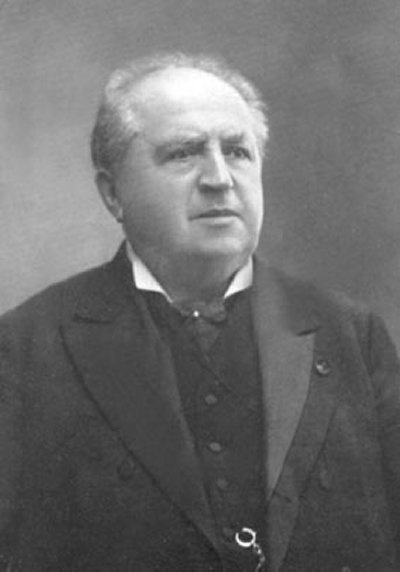He causeth the grass to grow for the cattle, and herbs for the service of man: that he may bring forth bread out of the earth; And wine that maketh glad the heart of man, and oil to make his face to shine, and bread which strengtheneth man’s heart.
—Ps. 104:14-15
The return of spring is a joyful event, the simple mention of which cheers even the most aged of men. Winter does not break up promptly on the twenty-first of March, neither does spring arrive on the stroke of the clock, even though it is said to be here. It sometimes takes several weeks before its evidences appear. But though it tarry long, at length there comes a day when the contrary winds recede, and the clouds make room to let the sunshine through, and the soft wind from the south breathes forth its beneficent warmth. On the evening before the air was still raw, the door was kept closed against the draught, and a fire was not out of place; but on the following morning everything has suddenly become different. The door can now remain open, the window even is raised to let the soft air in, as the house is more chilly than outside. And when you step into the air you are at once aware of the fostering sunshine which only pleases, and of the new, rejuvenated life that permeates all nature.
This rotation of the seasons is one of the inventions of God’s grace. No Edison has thought this out and no philosopher has planned it. Before there ever was a spring your God has entertained the thought of it in Himself. What spring should be, what it should do, how it should operate in nature, how it should affect man when created, God has thought out by Himself, and determined in His counsel long before the earth had existence. And when the creation took place God arranged the course of the earth in its orbit, its rotation on its axis, and its position in the solar system, so artistically and so wonderfully that spring has to come of itself, and with it all the goodness which, of joy in the rejuvenation of life, He intended that this season should bring.
Spring also does not come of itself, but as the effect of Divine thought, purpose and ordinance. And as often as the procession of the seasons reaches spring again, it is the Divine Omnipotence which causes it to return, and makes it to operate as of old and uses it as the instrument by which to work gladness in the heart of man.
But were it not for winter we would have no occasion for knowing the joy of returning spring.
What an oppressive force of monotony there would be poured out over our human life in case the seasons did not follow each other in regular succession; in case it were ever the same, unbroken condition of things. It is true that in many ways the winter season is hard, even though it has many pleasures of its own. But were it not for winter we would have no occasion for knowing the joy of returning spring. And the broad range of impressions, and all the breaks in the monotony of our earthly existence, and all the fulness of joys which the change of the seasons occasions in our human life we owe solely and alone to the wisdom and the goodness of the Lord, by which our life in the earth and the earth for our human life were appointed as they are.
Hence it is a phase of impiety when year after year all this is experienced and enjoyed without the heart being lifted up in gratitude and worship unto Him who is the source of our life, and from Whom flows out unto us all this variegated change in our existence.
The child of Eve considers it. In the days of old the Psalmist sang: “The day is thine, the night also is thine; thou has prepared the light and the sun. Thou hast set all the borders of the earth: though has made summer and winter” (Ps. 74:16, 17).
Another power lives
In a season like this a divine message goes out to us. There is no speech nor language where its voice is not heard. And as by night the starry heaven showeth knowledge, so each return of spring repeats the story of the potency, fidelity and goodness of the Lord.
When at first everything in nature about you is withered and deathlike, and for months you have gazed upon the barren ground, leafless trees, and dry shrubs; and when suddenly a new life breaks forth from this barrenness and buds appear on the branches, and the tender grass appears, and the lilies of the valley begin to unfold their little cups; then you feel and realize that beneath, behind and above all nature round about you, there is still another power that lives, which at first withdrew itself, which for long months held itself in check and apparently did not operate at all, but which now suddenly makes an appearance.
In spring God returns to nature with His Omnipotence to waken her from her winter sleep, to raise her up from her long rest, and, animating her with new vitality, to call her to newness of life. It seems as though in spring the Lord speaks out from every tree and plant, from every blade of grass and bud that opens, saying: Behold, here am I, your God, who have fed you by the earth, and fostered you by the sun and who now returns to cause the bread again to come forth from the earth, to fill your barns with plenty and your storehouses with wine that maketh glad the heart of man.
We are so needy and so deeply dependent. If nature remained dead as it was in winter, in one year the human race would perish by starvation; there would be no more human existence upon earth conceivable. Our life would hang on the issue of whether the earth would bud again, and nature resume her operations, and whether with it all our life and the life of our children would again be invigorated by the forces of nature.
And see, now it comes, for spring is again in the land. And what was withered takes on new color and what was deathlike for stillness becomes vocal with new life. Here also was a valley of death, and behold life arises as from its winter grave. The young green abounds, the wheat fields whiten, the branches bud and the flowers bloom. It is all a prophecy of beautiful loveliness, and no less of abundant harvests when the reaper puts forth the sickle into the corn, and the sheaves are carried into barns and the wheat is threshed, and the mill grinds out the flour, and the bread is brought to your table. The process is long and slow, but its beginning always is, that God makes the sun work again His wonders, and that He sprinkles the roots with His rain, or, as the Psalmist has it, “that God again causes the bread to spring forth from the earth.”
Death’s dominion broken
This also is the significance of Easter in spring. For the Paschal feast is spring in the world of spirits, even as spring is one potent pascha in all the visible creation of our God. Even now as of old the fool says in his heart that it is done with life, that what is dead once remains dead, and that they are fancies with which we flatter ourselves when we dream of a life beyond the grave. But this is none other than disbelief in spring because it is winter. And when each time again after the long, hard winter spring comes back from the treasure chambers of our God, and gladdens the heart with its beauty, it ever repeats the glad tidings from of old that with God there is resurrection from death. Not as though life could ever come forth out of death, but because God is beneath, behind and above death, and because, stronger than death, He compels death each time again to loosen his hold on his prey and to let life come out anew.
And that same God who raised Christ from the dead, is He who, in the language of spring, has prophesied unto us a like resurrection from the grave.
It is not all of spring. There would be no spring if it were not for winter. The very significance of spring is, that first there was winter, when Death swayed his scepter, and that now his dominion is broken and life is renewed. In this way all nature is one holy symbolism. And that same God who raised Christ from the dead, is He who, in the language of spring, has prophesied unto us a like resurrection from the grave.
This applies also to the life of the soul. There, too, it is oftentimes winter. When the heart is like the brown earth, and the soul like a leafless branch, and all our spirituality as a bush without bud; when a deathlike stillness prevails in the inner life, and no ray of sunlight breaks through the clouds of indifference; when nothing spiritual springs up within us; when we bear no fruit, and when the feeling takes hold of one as though held in place to no purpose. And this state of the soul originated in the fact that God was no longer present in our consciousness, and that the heart undertook to get on without God, and the weakening of spiritual vitality made ever greater advances in the process of withering and sin.
And this same God comes to you in this season of spring to raise you up out of your spiritual languishing and to tell that it will not always be winter in your soul. That after the winter the genial rays of the sun in spring can shine again in your heart and that from the withered soul of your inner life new fruit can and will be produced.
This coming of spring to the soul you have known from earlier experience, when after great discouragements you felt yourself lifted up again, and after the chill of indifference, grace glowed again within you, with all its fostering warmth, and when what seemed dead was quickened within you to a new life.
Thus we have spring in nature. So there shall be an eternal spring in the day of resurrection. And so let there be spring in the life of the heart here and now; not merely for the sake of returning joys for ourselves, but rather that fruit may again be borne in our lives to the glory of God.
This essay is adapted from and originally appeared in The Christian Intelligencer, June 12, 1901, p. 375, translated by J. Hendrik de Vries. The Acton Institute is a sponsor of the twelve-volume Abraham Kuyper Collected Works in Public Theology.




